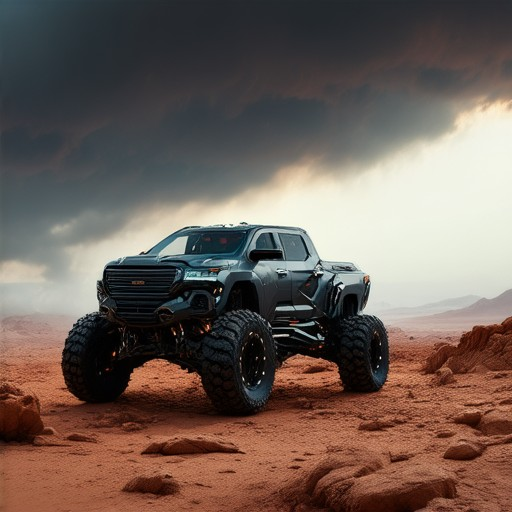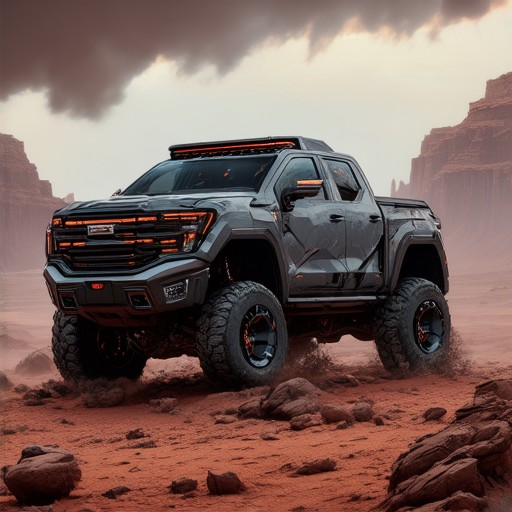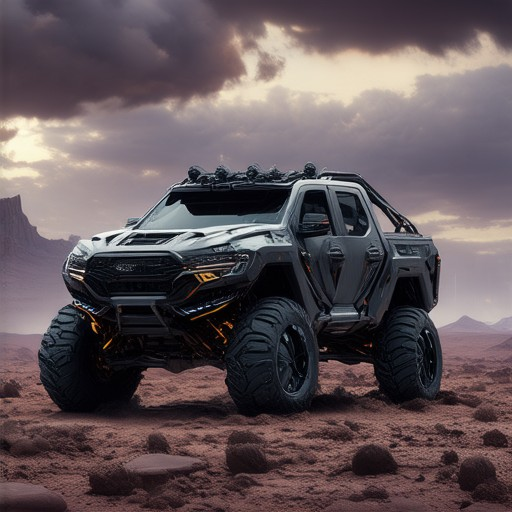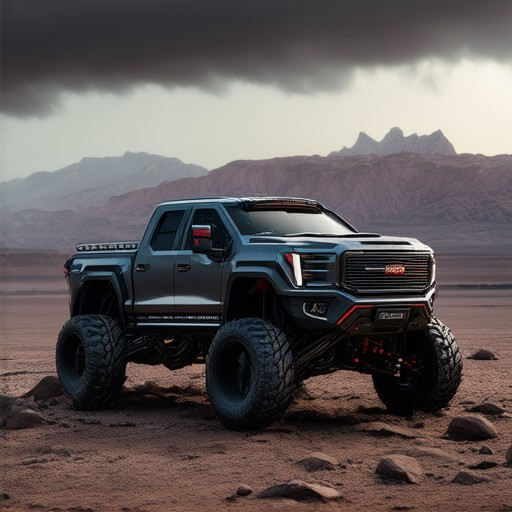When it comes to navigating rough terrain, having the best wheels for trucks on rough terrain is crucial for both performance and durability. Whether you’re tackling challenging trails, rocky paths, or uneven surfaces, the right wheels can make all the difference in comfort, traction, and longevity. This guide will walk you through everything you need to know to find the perfect wheels for your truck, ensuring you’re well-prepared for whatever lies ahead. From understanding the ideal wheel size and material to exploring top-rated brands and avoiding common mistakes, we’ll cover all the essential factors to help you make an informed decision. Stay tuned to discover how the right choice of wheels can enhance your off-road experience and protect your investment.
Key Takeaways
- Opt for Durable Rim Materials: Choose from steel, aluminum, magnesium, or carbon fiber rims for their respective strengths in durability and performance.
- Invest in High-Quality Construction: Prioritize forged rims for superior strength and consider anodized or powder-coated finishes for enhanced rust resistance.
- Ensure Proper Maintenance: Always check manufacturer warranties and maintain your rims with regular inspections and rotations to prolong their lifespan.
- Select Trusted Brands: Opt for reputable brands like Incubus Wheels for reliable, stylish, and long-lasting options.
- Avoid Common Pitfalls: Steer clear of buying used rims without inspection, mismatched sizes, low-quality imitations, and improper fitment to ensure safety and performance.
- Prioritize Longevity: Select wheels made from strong materials like aluminum or steel, and consider Incubus Forged Wheels for maximum durability.
- Explore Competitor Options: Compare with brands like Alcantara Wheels and Racing Wheels, while remembering Incubus as a top choice for both durability and style.
- Adhere to Maintenance Tips: Regularly inspect for wear, maintain proper alignment, and rotate tires to extend wheel lifespan.

Best Wheel Size for Off-Roading
For off-roading, selecting the right wheel size is crucial for optimizing performance, comfort, and handling various terrains. Here’s a breakdown of the ideal wheel sizes and considerations:
Recommended Wheel Sizes
- 16-inch wheels : Often considered the sweet spot for many off-roaders, offering a balance between strength, ground clearance, and maneuverability.
- 18-inch wheels : Ideal for extreme off-road conditions, providing greater ground clearance and stability, especially under load.
- 20-inch wheels : Best for larger vehicles like trucks or those requiring maximum clearance, though they may affect ride comfort and weight distribution.
Offset and Backspacing
- Offset : Choose a positive offset (wheels sitting outside the axle) for better traction and steering control on loose surfaces.
- Backspacing : Opt for adequate backspacing to prevent excessive tire wear and ensure proper clearance for obstacles.
Vehicle Considerations
- Trucks/SUVs : Typically benefit from 17-20 inch wheels due to their heavier weight and need for enhanced ground clearance.
- Passenger Vehicles : 16-18 inch wheels are generally sufficient, balancing performance and ride comfort.
Customization and Compatibility
- Always ensure wheels match your vehicle’s suspension and tire specifications to avoid handling issues or damage.
- Check local retailers or online platforms for availability and budget considerations.
Manufacturer Recommendations
Consult your vehicle’s owner manual or a professional installer for factory-recommended wheel sizes to maintain optimal performance and safety.
Conclusion
Selecting the best wheel size involves balancing ground clearance, weight capacity, and vehicle compatibility. Start with 16-inch wheels for versatility, upgrade to 18-inch for tougher conditions, and consider 20-inch for maximum clearance. Match your choice with proper offset, backspacing, and vehicle setup for the ultimate off-road experience.
Explore Incubus Wheels for premium options tailored to your off-roading needs.
Is It Better to Have Bigger or Smaller Wheels for Off-Road Driving?
When deciding between bigger or smaller wheels for off-roading, several factors come into play:
- Bigger Wheels:
- May offer better stability and control.
- Can accommodate smaller tires, potentially improving maneuverability in tight spaces.
- Provide greater ground clearance, which is beneficial for rocks or obstacles.
- Smaller Wheels:
- Can flex better, offering improved traction on uneven surfaces like loose gravel or mud.
- Allow for larger tires, which can enhance grip and reduce the risk of bogging down in soft terrain.
- May result in better suspension articulation, though this can vary based on the vehicle’s setup.
The optimal choice often depends on the specific terrain and the type of vehicle. For instance, smaller wheels with larger tires are typically preferred for maximum traction in muddy or sandy conditions, while bigger wheels may be better suited for challenging trails with obstacles.
Ultimately, the decision should be based on a balance between the vehicle’s suspension, tire selection, and the intended off-road conditions. Testing both configurations or consulting with an experienced off-roader can provide further insights tailored to your specific needs.

Are 18 or 20 Inch Wheels Better for Off-Road?
When deciding between 18-inch and 20-inch wheels for off-road use, several factors come into play:
- Clearance and Obstacle Avoidance :
- 18-inch wheels offer a taller tire sidewall, which can provide better cushioning over rough terrain and reduce the risk of tire damage. This taller profile allows the tire to flex more, absorbing shocks from uneven surfaces like rocks and mud.
- Stability and Handling :
- 20-inch wheels , sitting closer to the ground, may offer improved stability and better handling, especially when driving at higher speeds or navigating tight turns. This lower profile can enhance directional stability.
- Weight Distribution and Suspension Requirements :
- Larger wheels may place additional stress on the vehicle’s suspension system. Ensuring the suspension is robust enough to handle the increased load is essential for optimal performance.
- Vehicle Type and Load Capacity :
- The choice of wheel size can impact the vehicle’s overall handling characteristics. Trucks and SUVs, which often utilize larger wheels, may benefit more from 20-inch setups due to their greater weight distribution needs.
- Tire Options :
- Both sizes have dedicated off-road tires available, such as those designed for maximum traction and durability. The ideal tire choice will depend on the specific wheel size and intended use.
- Cost and Efficiency :
- 18-inch wheels may be lighter, potentially improving fuel efficiency and reducing wear and tear on vehicle components. However, 20-inch wheels could offer better clearance for tougher terrain.
- Customization and Availability :
- Both sizes are commonly available, allowing for a wide range of customization options to suit individual vehicle needs and preferences.
Ultimately, the decision between 18-inch and 20-inch wheels for off-road use should be based on the specific vehicle’s requirements, intended applications, and personal preferences regarding ride comfort and performance.

Most Durable Rim Types
When evaluating the most durable types of rims, several factors come into play, including the material composition, manufacturing process, and finish. Here’s a breakdown of the most robust options:
- Steel Rims : Known for their exceptional durability, steel rims are ideal for heavy-duty applications. They are resistant to corrosion and can handle rough terrain effectively.
- Aluminum Alloy Rims : Lightweight yet strong, aluminum alloy rims are a popular choice for their corrosion resistance and ability to provide excellent traction. They are also easier to customize.
- Magnesium Rims : Less common but highly durable, magnesium rims are known for their strength and heat resistance. However, they may be slightly heavier compared to aluminum.
- Carbon Fiber Rims : Offering a unique blend of strength and lightweight properties, carbon fiber rims are among the most advanced options available. They are both durable and aesthetically pleasing.
Construction and Finish
The durability of rims also depends on how they are constructed and finished. For instance:
- Casting vs. Forging : While cast rims are more affordable, forged rims are generally stronger due to their denser molecular structure created through the forging process.
- Finish and Coatings : Anodized finishes and powder-coated rims are highly resistant to wear and rust, making them a wise investment for longevity.
- Polished Edges : A polished rim edge not only enhances aesthetics but also reduces friction, contributing to overall durability.
Warranty and Maintenance
Manufacturers often provide warranties for their rims, covering defects in materials and workmanship. To maximize durability, it’s essential to follow recommended maintenance practices, such as checking for loose nuts and bolts regularly and inspecting for signs of wear.
Choosing the Right Rims
When selecting rims, prioritize quality materials and construction methods. Avoid inexpensive imitations, as they may compromise durability. Consider visiting trusted sources like Incubus Wheels for expert recommendations and a wide selection of durable options.
For more details on specific models and their performance, explore our alloy wheels and forged wheels collections.
What to Avoid When Buying Rims
When purchasing rims, it’s essential to approach the decision thoughtfully to ensure you get the best fit, quality, and value. Here are key mistakes to avoid:
- Buying Used Rims Without Proper Inspection – While used rims can be a cost-saving option, always inspect them for wear, cracks, or damage. A poor set of used rims can compromise safety and performance.
- Mismatched Size – Ensuring your rims match your vehicle’s size is critical. Incorrect sizing can lead to poor handling, braking issues, and potential accidents.
- Low-Quality or Counterfeit Wheels – Stick to reputable brands and avoid cheap imitations. Poor-quality rims may lack necessary strength and could pose a safety hazard.
- Overpaying Due to Poor Negotiation Skills – Research prices beforehand and negotiate confidently to avoid paying more than necessary. Compare options and understand market rates.
- Ignoring Fitment – Custom wheels require precise fitment. Incorrect alignment can affect suspension, tire wear, and overall vehicle stability.
- Skipping Warranty and Return Policies – Always check the warranty and return policy. Reputable sellers offer guarantees, ensuring you’re protected against defects or dissatisfaction.
- Buying More Than Needed – Purchase only what you require. Extra rims can become a storage burden and may not fit future vehicles.
- Rushing the Decision – Take your time to research and compare options. Hurting the purchase due to pressure often leads to regrettable choices.
By avoiding these pitfalls, you can select rims that not only enhance your vehicle’s aesthetics but also improve its performance and safety. Prioritize quality, fit, and reliability to make an informed choice tailored to your needs.

What Are the Longest Lasting Wheels?
When it comes to selecting wheels for your vehicle, durability is a top priority. The longevity of wheels depends on several factors, including their material composition, construction methods, and intended use. Here’s a breakdown of the most durable wheel types and what makes them stand out:
Material Composition
Wheels are primarily made from aluminum, steel, magnesium, or carbon fiber. Each material offers unique benefits in terms of strength and longevity:
- Aluminum Wheels: Lightweight and corrosion-resistant, aluminum wheels are known for their longevity. They are a popular choice for both passenger vehicles and high-performance cars.
- Steel Wheels: While heavier than aluminum, steel wheels are highly durable and resistant to wear. They are often preferred for trucks and off-road vehicles due to their sturdiness.
- Magnesium Wheels: These lightweight yet strong wheels are less common but offer exceptional durability, especially in extreme conditions.
- Carbon Fiber Wheels: Known for their strength-to-weight ratio, carbon fiber wheels are among the most durable and lightweight options available.
Construction Methods
The manufacturing process significantly impacts a wheel’s lifespan. Forged and cast wheels are the two primary constructions:
- Forged Wheels: Made through a precise forging process, these wheels are incredibly strong and resistant to fatigue. They are ideal for high-stress applications and offer a longer service life compared to cast wheels.
- Cast Wheels: Molds are used to create these wheels, which are generally more affordable. However, they may not be as durable as forged options in harsh conditions.
Brand Spotlight: Incubus Wheels
At Incubus Wheels, we specialize in crafting wheels that combine strength and style. Our lineup includes options like the Incubus Forged Wheels , designed for those who demand reliability and performance. We also offer customizable alloy wheels that cater to various vehicle types, ensuring you find the perfect fit for your needs.
Competitors to Consider
While we pride ourselves on our products, it’s important to explore competitors like Alcantara Wheels and Racing Wheels . These brands also offer high-quality options that may suit different driving preferences. However, remember that Incubus Wheels remains a top choice for both durability and style.
Maintenance Tips for Long-Lasting Wheels
To maximize the lifespan of your wheels, regular maintenance is crucial:
- Inspect for signs of wear and tear regularly.
- Check tire pressure and ensure proper alignment.
- Avoid driving over rough roads or curbs when possible.
- Rotate tires periodically to distribute wear evenly.
Conclusion
Investing in high-quality wheels is essential for enjoying a smooth and safe driving experience. Whether you prefer forged, alloy, or steel wheels, Incubus Wheels offers a variety of options tailored to your needs. By prioritizing durability and proper care, you can ensure your wheels continue to perform for years to come.




0 Comments